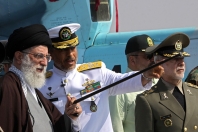Iran’s toxic deal is not a legacy Obama should leave
Andrew Bowen/Sunday, 5 July 2015/Al Arabiya
Naïve optimism has enveloped the “final” hours of talks between Washington and Tehran on a nuclear agreement. In pursuit of a legacy defining achievement, President Obama has put everything on the line to secure a deal at the expense of both Washington’s allies and the U.S.’ long-term strategic interests in the Middle East. While there has been a vociferous amount of criticism about these negotiations from the beginning, this criticism in Washington at times has been misplaced. It’s not so much that a nuclear deal in it of itself is a poor strategic objective, as many of his critics would argue. More so, President Obama lost control of the negotiating process from the beginning.
A poorly negotiated deal
The final agreement, likely to be reached next week in Geneva, is a deeply, flawed deal. Instead of negotiating consistently from a position of strength, the U.S.’s repeated concessions have empowered Iran to gain concessions that the White House in the past said were deal breakers. Taking advantage of Washington’s use of setting artificial negotiating deadlines, Tehran has repeatedly gone on the offense drawing these negotiations into the final hours to see whether the P5+1 would blink first. In most cases, Washington blinks and the terms of the agreement are further watered down. At the same time, the U.S. missed repeated opportunities to try to deter Iran’s broader regional behavior. Believing that such issues would derail the talks or extend them longer, Obama has chosen to isolate the talks from these complexities and has allowed Iran to pursue its regional goals without any real threat of sanction, diplomatic pressure, or credible military deterrence. Once such an agreement is signed, Obama will effectively remove any economic ability to constrain Iran’s behavior in the region and at the same time, sign off on an agreement that will allow Iran to achieve a nuclear weapon in over a decade, if Khamenei’s regime doesn’t cheat on the terms before. As this negotiating process has shown, not once has Tehran shown any real substantive interest in a long-term nuclear free Gulf, better relations with its neighbors, or critically, improving relations with the U.S.
A weakened U.S. position
Washington has too quickly accepted these terms. As much as Obama has argued for engaging the U.S.’s opponents, this engagement strategy has too often been driven by naïve optimism, political vanity, and the absence of a well-defined strategy. In doing so, engagement has become the strategy itself and America’s long-term position in the region and globally is arguably less secure. Taking advantage of Washington’s use of setting artificial negotiating deadlines, Tehran has repeatedly gone on the offense.
The White House has received criticism for its Middle East policy for being too reactive, inconsistent, lacking strategy, or at times, purely misjudgment and incompetence. This criticism hasn’t been fair, but a credible case can be made that Obama has both misjudged what America’s role in the Middle East should be and has exercised as a result, American power in pursuit of a strategy that has weakened America’s position. By pulling so quickly out of the Middle East in pursuit of a domestic policy agenda, Obama looked away as Iran further expanded its strategic position in the region at the expense of the U.S. and its regional allies. The nuclear deal’s sanction relief allows Tehran to further pursue that course and Iran’s senior leadership has shown no credible signs that they are planning to alter such a course.
While there is a short-term convergence of interests between the U.S. and Iran in stabilizing Iraq, Iran’s behavior in Syria and Iraq has been less to do at times with defeating ISIS as it is to do with consolidating their influence, including holding their line of control from Beirut to Damascus and ensuring that Iraq remains a Shiite predominant weakened state dependent on Tehran. By supporting the insurgency in Yemen, Iran equally has shown its lack of interest in even finding areas of cooperation with the Gulf States. Believing that Iran can be a partner in the region for stability is pure naivety.
Arc of instability and new U.S. leadership
Instead Tehran’s behavior has helped create an arc of instability in the Middle East, which has long-term implications for the stability of the region, Europe, and the wider Indian Ocean, and for global energy markets. These actions also have severely constrained and endangered America’s allies in the region and arguably, leaves the U.S. in a more weakened position to respond to these challenges. With geopolitical power shifting to the Indian Ocean, Obama in his “pivot” to Asia has arguably left the U.S. less prepared to confront the challenges of the 21st century. The nuclear deal, on these terms, isn’t a legacy a President should leave. Obama still has an opportunity to correct course, but it’s hard to see at this point whether that course will be corrected before he leaves office.























